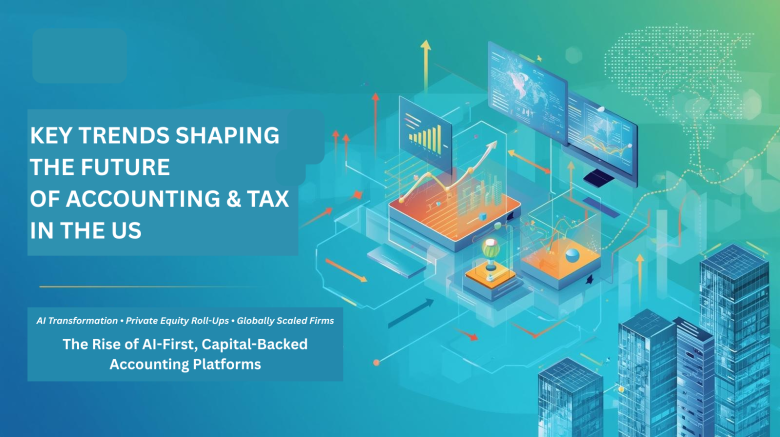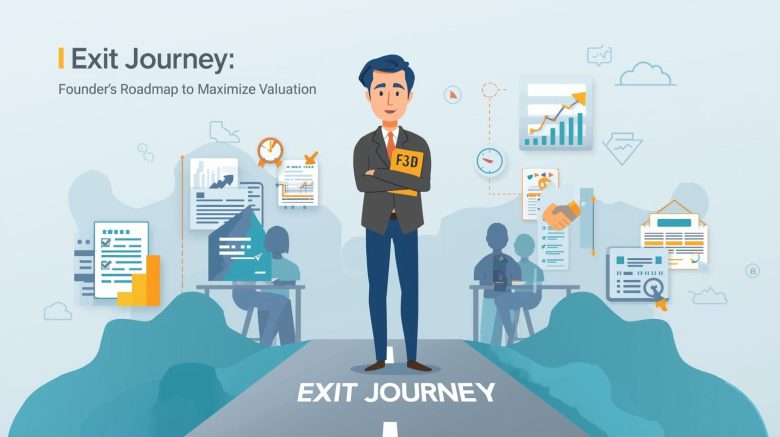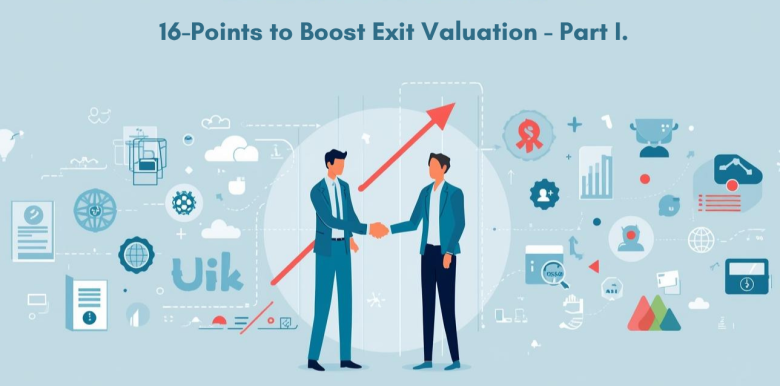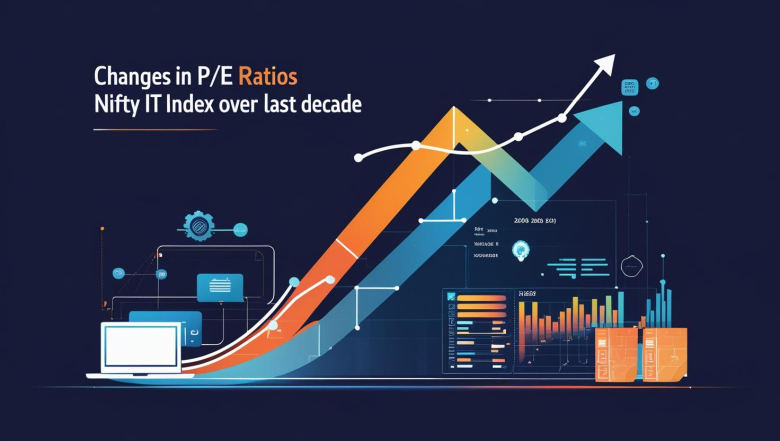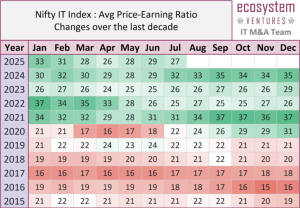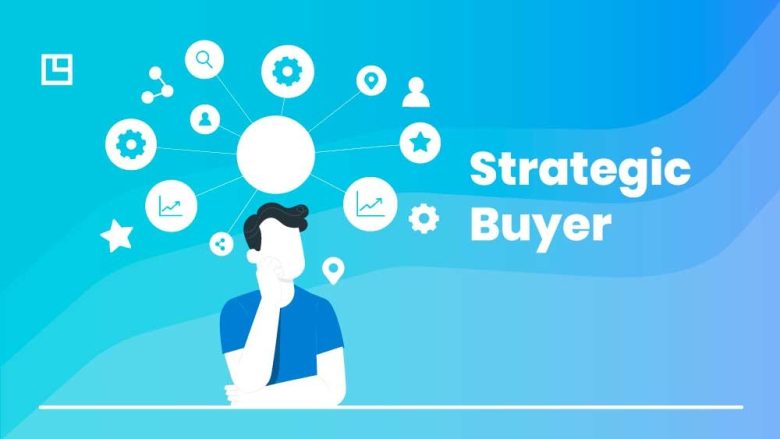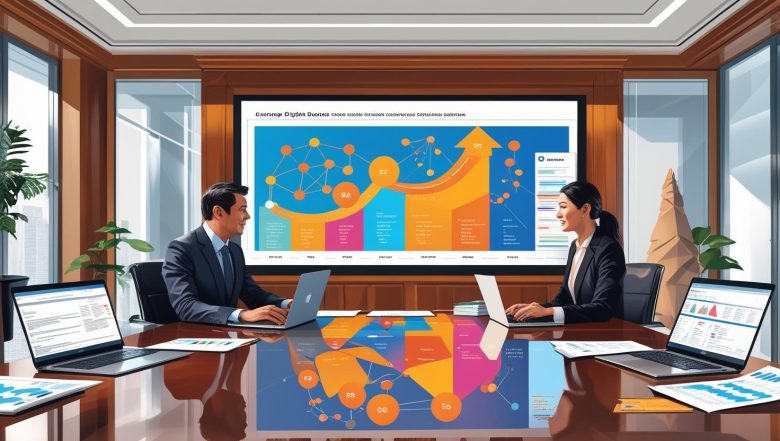Key Trends Shaping the Future of Accounting & Tax in the US
AI Transformation, Private Equity Roll-Ups, and the Rise of Globally-Scaled Firms
For decades, the U.S. accounting and tax services industry has historically been a steady, relationship-driven, and process-heavy industry. In 2025, the industry seems to have entered its most disruptive decade in modern history.
Three structural forces are converging:
- Artificial Intelligence transforming core workflows
- Private equity-driven consolidation and roll-ups
- The emergence of globally resourced, tech-enabled, capital-backed platforms
Together, these forces will redefine what a “firm” looks like, how services are delivered, and who wins.
1. AI Is Rewriting the Operating Model of Accounting
AI is often perceived as automation 2.0. However, AI goes far beyond just ‘better automation’ and is reshaping the entire value chain.
From Manual Processing to Autonomous Workflows
Traditional accounting activities like bookkeeping, reconciliations, AP/AR, tax prep, audit testing have been labor-intensive and rule-based. That makes it highly susceptible to AI transformation.
Key shifts underway:
- AI-driven bookkeeping (real-time categorization, anomaly detection)
- Automated tax research and drafting
- Predictive financial modeling
- Continuous audit monitoring
- AI copilots embedded in workflow systems
For example:
- Intuit has embedded generative AI across TurboTax and QuickBooks, enabling automated tax insights and conversational financial analysis.
- Thomson Reuters is investing heavily in AI-powered tax research and workflow automation across its Checkpoint and ONESOURCE platforms.
- AuditBoard is integrating AI into risk assessment and audit documentation processes.
AI will eliminate pretty much all low-leverage manual work.
Firms that deploy AI effectively will:
- Reduce cost per engagement
- Improve margins
- Deliver faster turnaround times
- Offer real-time advisory instead of backward-looking reporting
The shift is from “compliance processors” to “AI-augmented advisors.”
2. Private Equity Is Accelerating Consolidation
The accounting industry has been one of the most fragmented professional services sectors in the U.S. and this fragmentation will slowly disappear.
Why Private Equity Loves Accounting
Private equity firms see:
- Recurring revenue
- Sticky client relationships
- High margins
- Aging founder base (succession issues)
- Massive tech-driven upside
This has triggered a wave of platform acquisitions and roll-ups.
Recent examples include:
- EisnerAmper received private equity investment from TowerBrook Capital Partners.
- Citrin Cooperman partnering with New Mountain Capital.
- Grant Thornton sold a significant stake to New Mountain Capital.
These deals signal a structural shift.
PE-backed firms can:
- Invest aggressively in technology
- Acquire regional firms rapidly
- Build centralized shared service centers
- Standardize processes
- Expand advisory capabilities
This creates a widening gap between capital-backed consolidators and traditional independent practices.
3. Global Resourcing + AI = The New Competitive Advantage
The next generation of scaled firms will combine:
- U.S. client relationships
- Global delivery capability (India, Philippines, Eastern Europe)
- AI-native workflows
- Private equity capital
This model dramatically improves economics.
Why Global Delivery Matters More Now
Historically, offshoring focused on basic bookkeeping and data entry.
Now, global teams handle:
- Complex tax return preparation
- Audit support
- Financial modeling
- Advisory analytics
- AI model training and oversight
Firms leveraging global talent can:
- Operate 24/7
- Lower cost-to-serve
- Increase partner leverage ratios
- Improve margins while scaling
For example:
- BDO USA and RSM US have significantly expanded offshore and global capability centers.
- Aprio has aggressively expanded internationally to support U.S. growth.
But the true step-change comes when global resourcing is layered with AI.
4. The Emerging “AI-First Accounting Platform”
The fastest-scaling firms over the next decade will look fundamentally different.
They will:
a. Be Platform Businesses, Not Traditional Partnerships
They will be defined by standardized systems, centralized data, shared tech stack.
b. Use AI to Redesign Processes — Not Just Assist Them
Example: Instead of preparing a tax return manually and reviewing it, AI drafts, flags risks, and the CPA validates.
c. Centralize Global Delivery
Unified workflow across U.S. client-facing teams and offshore centers.
d. Be Backed by Growth Capital
Private equity provides funding for:
- M&A roll-ups
- Tech investment
- Talent acquisition
- Brand building
5. What This Means for the Market
A. Margin Compression for Traditional Firms
Firms that:
- Resist technology
- Avoid global delivery
- Lack capital access
Will struggle to compete on price, speed, and service breadth.
B. Rise of Mid-Market National Platforms
Expect to see:
- 20–30 large PE-backed accounting platforms
- Rapid regional consolidation
- Multi-state and cross-border capability
The middle market is especially attractive:
- Companies too small for Big Four
- Too complex for solo practitioners
C. Advisory Revenue Will Outpace Compliance
As AI commoditizes compliance, firms must shift to:
- CFO advisory
- Transaction advisory
- International tax structuring
- AI-enabled financial intelligence
- Data-driven decision support
The firm of the future generates a greater share of revenue from advisory than from basic tax prep.
6. Strategic Implications for Firms
To stay competitive, firms must:
a. Invest in AI Immediately
Not as an experiment, but as core infrastructure.
b. Build or Acquire Global Capability
Internal GCC (Global Capability Center) or strategic partnerships.
c. Consider Capital Partnerships
Private equity is no longer taboo in accounting; it is becoming mainstream.
d. Standardize Processes for Scalability
Roll-ups only work if integration is disciplined and tech-enabled.
7. The Big Picture: Industrialization of Professional Services
Accounting is shifting from:
Relationship-driven, partner-led craft model
to
Capital-backed, AI-enabled, globally scaled platforms
This transformation mirrors what happened in:
- Wealth management
- Insurance brokerage
- Dental practices
- Veterinary services
The playbook is clear:
- Fragmented market
- Recurring revenue
- Aging ownership
- Tech leverage
- Private equity roll-ups
Accounting is now firmly in that cycle.
Conclusion: The Firms That Will Win
The fastest-growing firms in the next decade will combine:
- AI-native workflows
- Centralized global delivery
- Private equity capital
- Aggressive M&A
- Strong advisory positioning
If you are a Founder in the Accounting & Tax space focused on the US / UK / Australian markets, we’d love to speak to you and explore how we can collaborate in this journey to build a formidable, scalable and globally respected firm.

